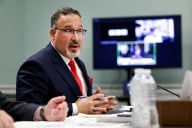You have /5 articles left.
Sign up for a free account or log in.
The American Association of University Women, or AAUW, is calling on policy makers to provide more emergency aid to college students, cancel up to $10,000 of loan debt and close the gender pay gap. The demand is in response to the increased economic uncertainty that women college graduates are now facing due to the coronavirus pandemic, the organization announced Thursday.
A new analysis released on May 20 by AAUW, a nonprofit organization that advocates for gender equity, found that more than two-thirds of student loan debt in the nation is held by women, particularly women who are black or the first in their families to attend college. Women were also found to make up nearly 59 percent of unemployment claims during the first weeks of the economic crisis caused by the pandemic, the analysis said. The financial difficulties 2020 college graduates especially are facing at this time are “untenable,” AAUW CEO Kim Churches said in a statement.
“They are graduating to record unemployment, a student debt crisis and the gender pay gap,” Churches said. “Even in a strong economy, student debt hurts the ability of women to buy homes, start a family or save for retirement. Unless we take decisive action, we’re crushing the future of a generation of women.”
Support to students and the unemployed through the Coronavirus Aid, Relief and Economic Security, or CARES, Act is not enough, Churches said. AAUW called on the federal government to direct emergency aid to students with the highest need, including Deferred Action for Childhood Arrivals students, who do not have U.S. citizenship status but make up 2 percent of college students in the country, the report said. The Department of Education has been criticized for excluding DACA students from aid allocated to colleges.
“Young people are finding themselves with mounting student debt and even fewer ways to pay it off,” the report said. “In order to ensure a full and equitable recovery from the pandemic and its economic fallout, it is imperative that we address these challenges in the months ahead.”








